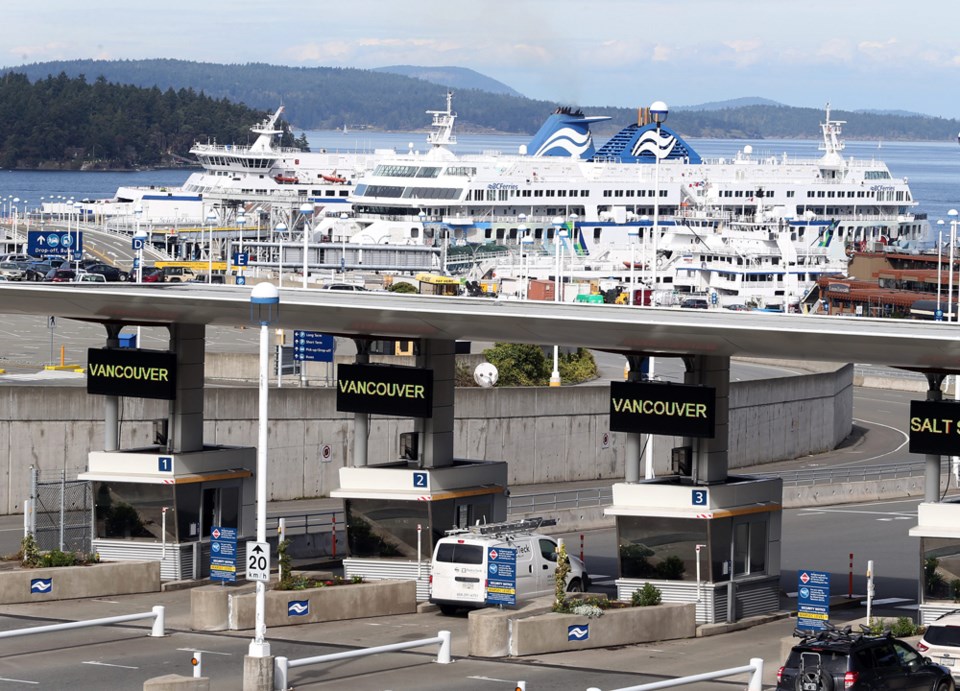An order against non-essential travel between health regions is now in effect on a number of B.C. Ferries routes, and the corporation says security staff will be on hand to help enforce it.
Anyone whose travel is not considered essential will be refused a ticket.
Routes affected include Swartz Bay and Tsawwassen, Duke Point in Nanaimo and Tsawwassen, the Southern Gulf Islands and Tsawwassen, Departure Bay in Nanaimo and Horseshoe Bay, Comox and Powell River, and Port Hardy and Prince Rupert.
Reasons for essential travel include commercial transportation of goods, returning to a principal residence, attending work or school, accessing child or health care, assisting someone needing physical or psychological health care, attending court, search and rescue operations, and attending a funeral.
There will be no extra sailings during the May long weekend. Normally, extra sailings are added for long-weekend travel because of demand.
Anyone booking a trip on B.C. Ferries’ website will now see a check box asking if they are travelling for essential reasons.
Customers are being asked at ticket booths if their trips are essential, and if they aren’t, they will not be sold a ticket, the corporation said.
“We’ll be asking the questions and relying on the honesty of the travellers to give us a straight answer,” Mark Collins, B.C. Ferries’ president and chief executive, said Friday. “B.C. Ferries supports doing everything we can to discourage non-essential travel, and this order gives us the legal authority we need to deny travel for non-essential reasons.”
The travel restrictions are expected to run until May 25, after the long weekend.
Extra managers and supervisors will be visible at terminals offering sailings between health regions to support front-line workers, Collins said.
Corporate and private security will also be on hand at terminals and on board vessels. If a traveller becomes upset, management will step in, he said.
Questions to motorists will be the same regardless of what they’re driving, he said, noting some essential travellers may need to travel with a recreational vehicle — for example, Island families taking children to B.C. Children’s Hospital for an extended stay may need to stay in an RV during that time.
“Obviously, that’s totally essential and in that case, the RV will certainly be travelling,” Collins said.
An RV packed with recreational gear may raise more questions, he said, and drivers will be asked to explain why their trip is essential.
If a driver maintains that the trip is essential, they will be sold a ticket because the process is based on the honour system, Collins said.
Additional security has been in place on vessels since last year, he said, “just to help everybody remain calm.”
A vessel sailing Swartz Bay to Tsawwassen turned back to port this month as a result of the behaviour of a belligerent anti-masker.
The man was met by police and has been banned indefinitely from B.C. Ferries, Collins said.
Those deemed to have crossed the line initially receive a one-day ban to allow B.C. Ferries to look into the incident.
After that, they may receive a longer-term ban, he said.
B.C. Ferries will not hesitate to impose a ban because it has an obligation to provide staff a safe and harassment-free workplace, Collins said. “We take that really seriously.”
Being banned from a ferry is a “pretty significant penalty,” especially for someone who lives on an island, he said.
Collins said there are no plans to have police stationed at terminals or on board, but they will be called upon if needed.
In recent days, ferry traffic has dropped to about 50 per cent of typical levels amid the third wave of the pandemic, Collins said.



